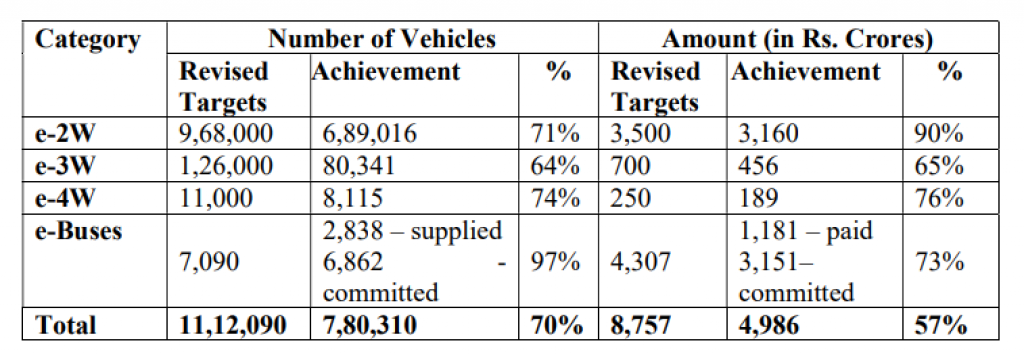FAME India Phase-II Scheme | 26 Dec 2023
For Prelims: Parliamentary Committee, FAME India Scheme Phase-II, Electric Mobility, National Electric Mobility Mission Plan, Vehicle Scrappage Policy.
For Mains: Government policies, EVs: Advantages, Challenges
Why in News?
The Parliamentary Standing Committee on Industry has recently put forth crucial recommendations regarding the extension and enhancement of the Faster Adoption and Manufacturing of (Hybrid &) Electric Vehicles in India (FAME India) Scheme Phase-II.
- The committee suggests extending the FAME India Phase-II Scheme's deadline by at least three more years to facilitate the transition momentum to electric mobility.
- The current deadline is March 31, 2024, with a budget allocation of Rs 10,000 crore.
What are the Committee Recommendations for Improvement?
- Restoration of Subsidy on Electric Two-Wheelers:
- The committee suggests restoring the subsidy on electric two-wheelers, which was reduced in June 2023.
- Government reduced the FAME-II subsidy for electric two-wheelers after June 1, 2023.
- The initial 40% incentive on ex-factory price was cut to 15%. Reduction in subsidies negatively impacted electric two-wheeler sales. Budget constraints cited as a reason for subsidy reallocation.
- Government reduced the FAME-II subsidy for electric two-wheelers after June 1, 2023.
- It also recommends projecting enhanced budget allocations, if required, to maintain the momentum and pace of electric vehicle penetration.
- The committee suggests restoring the subsidy on electric two-wheelers, which was reduced in June 2023.
- Inclusion of Private Electric Four-Wheelers:
- The ministry should increase the number of electric vehicles supported in the four-wheelers category and include private electric four-wheelers in the FAME-II Scheme, with a cap based on the cost and battery capacity of the vehicle.
- Supportive Government Frameworks:
- The committee emphasizes the need for supportive, transparent, and consistent government frameworks at national, state, and local levels to make India a global EV hub.
- It also recommends focusing on establishing dedicated manufacturing hubs and industrial parks for batteries, cells, and EV auto components.
- The committee emphasizes the need for supportive, transparent, and consistent government frameworks at national, state, and local levels to make India a global EV hub.
- Funding for BHEL and Charging Stations:
- More funds should be allocated to Bharat Heavy Electricals Limited (BHEL) to facilitate popularizing EV mobility.
- BHEL provided Engineering, Procurement, and Construction (EPC) solutions for EV charging stations. These include solar-based charging stations and battery energy storage systems.
- Additionally, public sector undertakings and government institutions should participate in installing charging stations on their premises.
- More funds should be allocated to Bharat Heavy Electricals Limited (BHEL) to facilitate popularizing EV mobility.
- Incentivizing Charging Station Installation:
- FAME-II should incentivise individual investors in charging stations. Women's self-help groups and cooperative societies should be assisted in opening and operating charging stations, with assured returns provided by the government from its funds.
What is the FAME India Scheme?
- Background:
- FAME India is a part of the National Electric Mobility Mission Plan.
- The scheme's main objective is to encourage the adoption of electric and hybrid vehicles by offering upfront incentives on purchase.
- The scheme covers Hybrid and electric technologies like Mild Hybrid, Strong Hybrid, Plug-in Hybrid and battery Electric Vehicles.
- Phase I:
- Started in 2015 and was completed on 31st March 2019, with an outlay of Rs 895 crore.
- The 1st phase of FAME The scheme had four focus areas namely, technology development, demand creation, pilot project, and charging infrastructure.
- Achievements:
- In the 1st phase of the scheme, about 2.78 lakh xEVs were supported with total demand incentives. In addition, 465 buses were sanctioned to various cities/states under this scheme.
- FAME India Phase-II:
- The Ministry of Heavy Industries is implementing the scheme for five years, starting April 1, 2019, with a total budget of Rs. 10,000 crore.
- This phase mainly focuses on supporting the electrification of public & shared transportation and aims to support through demand incentive eBuses, e-3 Wheelers, e-4 Wheeler Passenger Cars and e-2 Wheelers.
- In addition, the creation of charging infrastructure is also supported under the Scheme.
- Achievements:
What are the Other Government Initiatives to Promote EV Adoption?
UPSC Civil Services Examination, Previous Year Questions (PYQs)
Mains
Q. How is efficient and affordable urban mass transport key to the rapid economic development in India? (2019)

